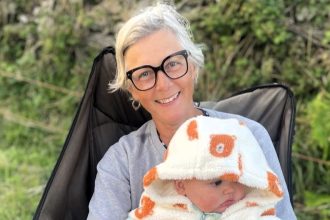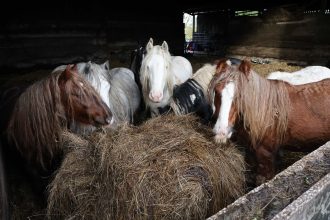Scientists are carrying out research into whether animal poo could be the secret to treating human superbugs.
It’s hoped the smelly stuff from tigers, elephants, giraffes and other exotic animals may stop a serious global threat.
Antimicrobial-resistant bacteria are on the rise.
READ MORE: Dad and daughter killed as aircraft crashes into field
Over the course of four years, there was an increase of 4,000 recorded serious antibiotic-resistant infections in the UK, according to the UK Health Security Agency.
These superbugs are rendering common treatments ineffective, leading to more long-term impacts, including death.
It’s expected by 2050, without intervention, that these types of bacteria will cause 10 million deaths globally.
But a rather smelly substance may hold the secret to saving lives.
Scientists at the University of Leicester have found that thousands of phages are hidden amongst animal poo.
These are naturally occurring viruses that only target bacteria and have huge potential to fight against life-threatening infections.
The Becky Mayer Centre for Phage Research at the university have gotten in touch with West Midlands Safari Park and Dudley Zoo to collect the muck – and find out if it could save lives.
“Bacteriaphages are naturally occurring viruses in the environment around us and can be found where bacteria occur in high numbers –making animal faeces a perfect place to look,” Dr Andrew Millard, who co-leads the centre, told Need To Know.

“We weren’t too sure how our request would be received at first, but once we explained the science, WMSP and Dudley Zoo were more than happy to accommodate and support our research.”
There’s plenty of poo on hand daily from more than 160 exotic species of animal on site at Dudley Zoo.
While the unusual request isn’t something the animal conservation sites usually partake in, it’s a mucky job that the keepers have to do everyday – now with a different purpose.
Professor Marth Clokie, co-director of the university’s centre, added: “It sounds funny, but we can’t wait to get our hands on the animal poo so that we can begin the work of looking for new phages.
“Our hope is to reach our target of 10,000 for our bio-bank within the next two years and this could really help us achieve that.
“We hope this highlights how animal conservation may also provide useful therapeutics, which may be used in the future to treat animals that also get infections.”
Evidence has been provided to the House of Commons Science, Innovation and Technology Select Committee Inquiry and to the UK Government’s five-year action plan for antimicrobial resistance.
READ MORE: Brazen shoplifter pedals off on bike clutching Tesco basket full of stolen goods










